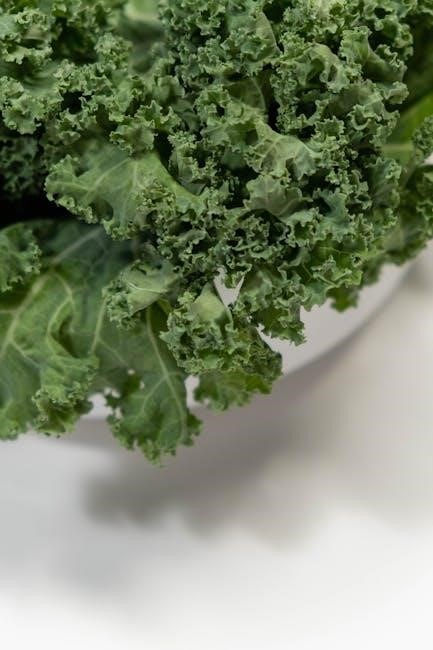
A low-carb vegetarian diet combines the benefits of reducing carbohydrate intake with plant-based eating‚ focusing on nutrient-dense foods while avoiding high-carb grains and sugars for better health and weight management.
1.1 What is a Low-Carb Vegetarian Diet?
A low-carb vegetarian diet combines plant-based eating with reduced carbohydrate intake‚ focusing on nutrient-dense foods like vegetables‚ healthy fats‚ and protein sources while limiting grains‚ sugars‚ and high-carb foods‚ aiming for around 100 grams of carbs daily to support weight loss and overall health without sacrificing essential nutrients.
1.2 Benefits of Combining Low-Carb and Vegetarian Lifestyles
Combining low-carb and vegetarian diets offers benefits like weight loss‚ improved blood sugar control‚ and enhanced heart health. It avoids high-carb grains and sugars‚ promoting nutrient-dense‚ plant-based foods. This approach supports long-term sustainability and provides variety‚ ensuring balanced nutrition while aiding in better energy levels and overall well-being.
Key Principles of a Low-Carb Vegetarian Diet Plan
Focus on restricting carbohydrate intake while emphasizing nutrient-dense‚ plant-based foods. Prioritize low-carb vegetables‚ healthy fats‚ and moderate protein to maintain balanced nutrition and support overall health goals.
2.1 Understanding Net Carbs and Daily Limits
Net carbs are calculated by subtracting fiber from total carbohydrates. Aiming for 20-50 grams of net carbs daily balances nutrition and weight loss. This approach supports blood sugar control and energy levels while maintaining a focus on whole‚ nutrient-dense foods.
2.2 Focus on Nutrient-Dense‚ Plant-Based Foods
Emphasize whole‚ unprocessed foods like leafy greens‚ broccoli‚ cauliflower‚ and avocado. Nuts‚ seeds‚ and tofu provide healthy fats and proteins. These foods are rich in vitamins‚ minerals‚ and fiber‚ ensuring nutritional balance while keeping carbs low. A variety of colorful vegetables and plant-based options supports weight management and overall health.
Foods to Include in a Low-Carb Vegetarian Diet
Focus on low-carb vegetables‚ protein-rich tofu‚ tempeh‚ and eggs‚ along with healthy fats like avocado‚ nuts‚ and seeds. Include select fruits like berries and tomatoes for balance and nutrition.
3.1 Low-Carb Vegetables (Leafy Greens‚ Broccoli‚ Cauliflower)
Low-carb vegetables like leafy greens‚ broccoli‚ and cauliflower are rich in fiber and nutrients. They provide essential vitamins‚ minerals‚ and antioxidants while keeping carbohydrate intake low. These vegetables are versatile and can be used in salads‚ stir-fries‚ and as substitutes for higher-carb options‚ making them ideal for a balanced low-carb vegetarian diet plan.
3.2 Protein Sources (Tofu‚ Tempeh‚ Seitan‚ Eggs)
Tofu‚ tempeh‚ seitan‚ and eggs are excellent protein sources in a low-carb vegetarian diet. Tofu and tempeh are versatile‚ offering plant-based protein with minimal carbs. Seitan‚ made from wheat gluten‚ provides a meat-like texture. Eggs are a low-carb‚ high-quality protein option‚ ensuring adequate protein intake without exceeding carbohydrate limits‚ making them ideal for a balanced meal plan.
3.3 Healthy Fats and Oils (Avocado‚ Olive Oil‚ Nuts‚ and Seeds)
Healthy fats like avocado‚ olive oil‚ nuts‚ and seeds are essential for a low-carb vegetarian diet. Avocado and olive oil provide monounsaturated fats‚ while nuts and seeds offer polyunsaturated fats and omega-3s. These fats support heart health‚ provide sustained energy‚ and enhance flavor. Include them moderately to balance your diet and promote overall wellness without exceeding carb limits.
3.4 Low-Carb Fruits (Berries‚ Avocado‚ Tomatoes)
Low-carb fruits like berries‚ avocado‚ and tomatoes are nutrient-rich and low in carbs. Berries are packed with antioxidants‚ while avocado provides healthy fats and fiber. Tomatoes are versatile and low in carbs‚ making them ideal for salads and recipes. These fruits support blood sugar control and add natural sweetness to meals without exceeding carb limits.
Foods to Avoid or Limit
Focus on eliminating high-carb grains‚ starchy vegetables‚ sugary foods‚ and legumes to maintain the diet’s effectiveness and promote better blood sugar control and weight management.
4.1 High-Carb Grains and Starches
Limit or avoid high-carb grains like bread‚ pasta‚ rice‚ and cereals‚ as well as starchy vegetables such as potatoes and corn. These foods are high in carbohydrates‚ which can hinder weight loss and blood sugar control‚ making them less ideal for a low-carb vegetarian diet. Opt for low-carb alternatives instead.
4;2 Legumes and High-Carb Vegetables
Legumes like lentils‚ beans‚ and chickpeas‚ as well as high-carb vegetables such as peas and winter squash‚ are rich in nutrients but also contain higher carbohydrate content. While they can be part of a balanced diet‚ they should be consumed in moderation or avoided on a strict low-carb plan to maintain ketosis and weight loss goals.
4.3 Sugary Foods and Drinks
Sugary foods and beverages‚ including sodas‚ juices‚ and desserts‚ are high in empty carbohydrates and calories. Limiting these items is crucial for effective weight loss and blood sugar control on a low-carb vegetarian diet‚ as they can hinder progress and lead to carb cravings and energy fluctuations.

Meal Planning and Preparing a 7-Day Meal Plan
A well-structured 7-day meal plan ensures variety and nutrition‚ offering balanced low-carb vegetarian options for breakfast‚ lunch‚ dinner‚ and snacks‚ tailored to support weight loss and overall health.
5.1 Breakfast Ideas (Eggs‚ Spinach‚ Avocado)
Start your day with nutrient-packed breakfasts like scrambled eggs with spinach and avocado‚ or avocado toast on low-carb bread. Try omelets with veggies‚ or a breakfast bowl with sautéed mushrooms and tomatoes. These options are rich in protein‚ healthy fats‚ and fiber‚ keeping you full and energized while staying low-carb.
5.2 Lunch and Dinner Options (Salads‚ Vegetable Stir-Fries‚ Cauliflower Rice)
Enjoy fresh salads with leafy greens‚ cucumbers‚ and bell peppers‚ topped with tofu or avocado. Vegetable stir-fries with broccoli‚ zucchini‚ and mushrooms‚ cooked in olive oil‚ make a hearty option. Cauliflower rice‚ seasoned with herbs‚ is a great low-carb base for meals. These options are rich in nutrients‚ fiber‚ and flavor‚ keeping you satisfied and on track.
5.3 Snacking on Low-Carb Vegetarian Options
Snacking on low-carb vegetarian options like nuts‚ seeds‚ and veggies keeps you satisfied. Try raw or roasted nuts‚ seeds‚ cucumber slices‚ or bell pepper strips. Avocado slices and hard-boiled eggs are also great. Tofu bites and veggie sticks with hummus make healthy choices. These snacks are nutrient-dense‚ curb cravings‚ and support your dietary goals without excess carbs.
Common Challenges and Solutions
Common challenges include managing carb cravings‚ ensuring adequate protein intake‚ and social pressures. Solutions involve planning snacks‚ incorporating plant-based proteins‚ and communicating dietary needs clearly to others.
6.1 Managing Carb Cravings
Managing carb cravings involves planning healthy snacks like nuts‚ seeds‚ and low-carb vegetables. Incorporate protein-rich meals to stay satisfied and reduce cravings. Mindful eating and staying hydrated can also help curb unnecessary snacking. Focus on nutrient-dense foods to keep energy levels stable and avoid carb-driven hunger spikes throughout the day.
6.2 Ensuring Adequate Protein Intake
Ensuring adequate protein intake is crucial on a low-carb vegetarian diet. Focus on plant-based proteins like tofu‚ tempeh‚ seitan‚ and eggs. Incorporate these into meals alongside healthy fats such as avocado and nuts. Aim for variety to meet daily protein needs and maintain muscle health while avoiding high-carb sources like legumes and grains.
6.3 Social and Practical Challenges of a Low-Carb Vegetarian Diet
Social gatherings and meal prepping can be challenging. Many vegetarian options are high in carbs‚ making it difficult to stick to the diet. Planning ahead‚ finding alternative recipes‚ and communicating dietary needs can help overcome these obstacles. Practical solutions include preparing low-carb versions of favorite dishes and seeking support from like-minded communities.

Health Benefits of a Low-Carb Vegetarian Diet
This diet promotes weight loss‚ improves blood sugar control‚ enhances heart health‚ and boosts energy levels by focusing on nutrient-dense‚ plant-based foods with minimal carbs.
7.1 Weight Loss and Improved Body Composition
A low-carb vegetarian diet promotes sustainable weight loss by reducing insulin levels‚ encouraging fat burning‚ and retaining muscle mass. It focuses on protein-rich foods like tofu and eggs‚ combined with fiber from vegetables‚ to keep you full and support metabolism‚ leading to improved body composition and long-term weight management.
7.2 Blood Sugar Control and Type 2 Diabetes Management
A low-carb vegetarian diet helps stabilize blood sugar levels by limiting carbohydrate intake‚ particularly from high-sugar foods. Studies show this approach improves glycemic control‚ reduces insulin resistance‚ and supports type 2 diabetes management. The focus on net carbs and fiber-rich plant-based foods helps regulate glucose levels‚ promoting better overall metabolic health.
7.3 Heart Health and Cholesterol Improvement
A low-carb vegetarian diet can improve heart health by reducing saturated fat intake and lowering LDL cholesterol. Emphasizing healthy fats like avocado‚ olive oil‚ and nuts supports cardiovascular wellness. The diet’s focus on plant-based foods‚ rich in fiber and antioxidants‚ helps regulate blood pressure and promote overall heart health‚ reducing the risk of cardiovascular diseases.
Scientific Evidence and Research
Scientific evidence supports low-carb vegetarian diets for effective weight loss and improved metabolic health‚ emphasizing nutrient balance and long-term sustainability and maintenance.
8.1 Studies on Low-Carb Diets and Vegetarian Diets
Research highlights the compatibility of low-carb and vegetarian diets‚ emphasizing their potential for weight loss and metabolic benefits. Studies suggest that well-planned low-carb vegetarian diets can improve blood sugar control and heart health‚ while maintaining essential nutrient intake‚ making them a viable option for long-term health management.
8.2 Long-Term Sustainability and Effectiveness
A well-structured low-carb vegetarian diet can be both sustainable and effective long-term‚ offering balanced nutrition and variety. By focusing on nutrient-dense foods‚ individuals can maintain energy levels and overall health while managing weight. Incorporating a variety of recipes and meal plans helps avoid plateaus‚ ensuring the diet remains enjoyable and achievable over time.

Safety Considerations and Potential Risks
A low-carb vegetarian diet may pose risks like nutrient deficiencies if not properly planned. Consult a healthcare provider‚ especially for those on medications‚ to ensure safety and balance.
9.1 Nutrient Deficiencies to Watch For
A low-carb vegetarian diet may lead to deficiencies in protein‚ iron‚ calcium‚ and vitamins B12 and D. Plant-based proteins can be less bioavailable‚ and avoiding high-carb dairy may reduce calcium intake. Iron absorption from plant foods is lower‚ and B12‚ found mainly in animal products‚ requires supplementation or fortified foods to maintain adequate levels and prevent health issues.
9.2 Special Considerations for Vegetarians on a Low-Carb Diet
Vegetarians on a low-carb diet must carefully balance protein sources like tofu and legumes‚ ensuring adequate intake without exceeding carb limits. Planning meals to include nutrient-dense foods like avocados‚ nuts‚ and seeds is crucial. Additionally‚ monitoring vitamin B12 levels and considering supplements can help mitigate potential deficiencies and maintain overall health effectively over time.

How to Get Started
Begin by setting realistic goals and planning meals in advance. Use tools like meal planners or apps to track progress and stay organized for success.
10.1 Setting Realistic Goals and Expectations
Start by defining clear‚ achievable objectives‚ such as gradual weight loss or improved blood sugar control. Set specific weekly goals and track progress to maintain motivation and ensure a sustainable transition to a low-carb vegetarian lifestyle.
10.2 Tools and Resources for Success
Utilize meal planners‚ diet tracking apps‚ and recipe guides to stay organized. Tools like macronutrient calculators and low-carb vegetarian cookbooks can help you make informed choices. Online communities and expert resources provide additional support to maintain your diet effectively and achieve long-term success.
Maintaining the Diet Long-Term
Maintaining a low-carb vegetarian diet requires consistent effort‚ creativity‚ and planning. Incorporate variety‚ explore new recipes‚ and stay committed to your goals for long-term success.
11.1 Incorporating Variety and Avoiding Plateaus
Incorporating variety is key to avoiding plateaus on a low-carb vegetarian diet. Experiment with new recipes‚ rotate protein sources‚ and explore global cuisines. Meal planning resources‚ like a 7-day menu‚ can help keep meals exciting and balanced‚ ensuring you stay motivated and nourished without feeling restricted or bored over time.
11.2 Mindset Shifts for Sustainable Lifestyle Changes
Embracing a low-carb vegetarian lifestyle requires a mindset shift from short-term dieting to long-term wellness. Focus on progress‚ not perfection‚ and prioritize enjoyment of nutrient-dense foods. Setting realistic goals and cultivating a positive relationship with food fosters sustainability. View this journey as a lifestyle transformation‚ not a restriction‚ to maintain motivation and overall well-being.
A low-carb vegetarian diet offers a balanced approach to weight loss and improved health. Stay consistent‚ listen to your body‚ and enjoy the journey to sustainable wellness.
12.1 Summary of Key Takeaways
A low-carb vegetarian diet balances weight loss and improved health by focusing on nutrient-dense foods like vegetables‚ healthy fats‚ and moderate protein. Daily carb intake is controlled‚ with an emphasis on variety and consistency. This approach supports long-term wellness and sustainability‚ encouraging a mindful eating habits and regular consultation with healthcare providers for personalized advice.
12.2 Encouragement and Next Steps
Embrace your low-carb vegetarian journey with confidence! Celebrate small victories and stay committed to your goals. Seek support from healthcare providers or online communities. Experiment with new recipes and tools to maintain variety. Remember‚ this lifestyle is a sustainable path to better health and long-term weight management. Keep moving forward with positivity and determination!